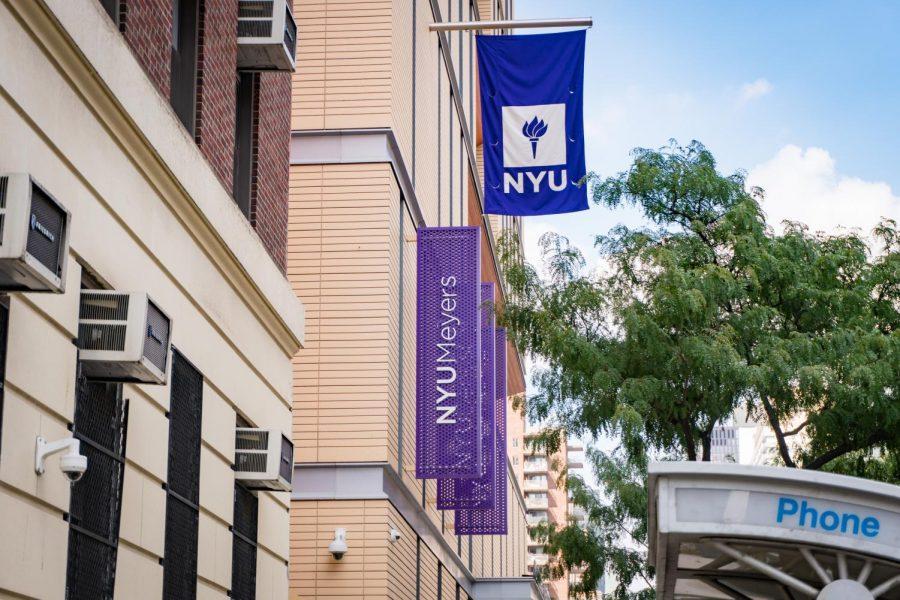Opinion: NYU’s nutrition curriculum should not promote diet culture
For a class titled “Nutrition and Health,” the professor and the syllabus promote rather unsettling, unhealthy eating attitudes.
File photo: NYU Rory Meyers College of Nursing located on 433 1st Ave. (Tony Wu for WSN)
October 12, 2022
Content warning: This article contains mentions of eating disorders.
My heart sank when I read my Nutrition and Health syllabus. I thought that as a nursing major, I would be learning about proper nutrient intake for myself and my future patients. Instead, I saw assignments regarding calorie counting — the professor makes every lesson about weight loss.
One of the course readings is course instructor Lisa R. Young’s “Finally Full, Finally Slim: 30 Days to Permanent Weight Loss One Portion at a Time.” After supporting a loved one through eating disorder recovery, I know what a toxic eating message looks like when I see one.
The title of Young’s book promotes the idea that eating decisions should be made in order to lose weight and be skinny, rather than to give your body what it needs. Rory Meyers sophomore Ryan Pierson, a fellow classmate, also wondered why the course focuses more on weight loss instead of health concerns.
“Why is so much of the nutritional information we have guided towards losing weight rather than getting the right amount of nutrients and the right amount of energy that you need?” Pierson said. “The focus should be on meeting your body’s nutrient and energy needs, not on looking a certain way.”
Our first assignment was to write down everything we ate for a day, including portion sizes and which nutrient groups the foods belonged to. I and many of my classmates immediately felt uncomfortable with the task. When your food intake is meticulously organized, you awaken your own worst critic: yourself. No matter how educational an assignment is, if there is a resounding discomfort for students in completing it, a change is necessary.
The professor allowed us to complete the assignment using someone else’s daily diet, but many of us weren’t comfortable asking any friends or family to reveal such personal information.
The biggest assignment is a two-part project which will ask us to write down everything we eat and drink for three days and enter it into the online program, Diet and Wellness Plus, where we’ll receive a variety of reports about the quality of our meals. The second half of the project is a written summary of our diet. We need to analyze where it fails to meet dietary standards and evaluate caloric and nutritional intake, and then provide realistic suggestions for areas of improvement.
You could argue that meticulously analyzing your own diet could help with learning how to evaluate patients in the future, while also providing some element of self-reflection that could make us more compassionate, more successful nurses. But in a class full of impressionable young adults, it’s particularly concerning that we are learning to restrict our diets for a grade. Pierson was also concerned with how the course can possibly impact students.
“It doesn’t mean that it’s going to give everyone an eating disorder, but for people who have a history of that, it could be very triggering,” she said.
Considering the college demographic of our course, it’s dangerous to be promoting such unhealthy eating attitudes. Eating disorders are rampant among college students, and for those who aren’t actively practicing disordered eating, the pressure to do so lurks around every corner. Eating disorders are no small thing, and it negatively impacts the mental health of people as young as middle childhood.
There’s also the question of whether or not the professor is legally allowed to request a student’s dietary information. According to the Family Educational Rights and Privacy Act, which is mentioned in the syllabus, such information can not be accessed by community members other than oneself, including professors, because the information may be specifically classified as a medical record.
Does a detailed account of a student’s diet for multiple days constitute a medical record? I would say it’s equivalent. Is my professor providing me with some form of treatment, making her access to this record necessary? No. Have I consented to dietary treatment by either my professor or the Diet and Wellness Plus program, which students are required to pay for? No.
Rory Meyers sophomore Magdiel Sanchez finds the course problematic because of his previous experiences with disordered eating.
“As someone who had an eating disorder and used to count his calories, every single day, to the bone, I don’t think health and nutrition [are] necessarily learning about counting your calories,” he said.
At the bare minimum, our professor should offer an example diet to complete assignments, but I would suggest a complete reworking of the course. Why are we learning about restricting and dieting, when we could learn about treating chronic illnesses, addressing fertility diets or even beating cancer through nutrition? We could be discussing how to overcome inequities in healthcare and providing everyone with access to nutritional foods. Those are the topics a Nutrition and Health class should be covering, but instead, I feel like I’m in Eating Disorder 101.
WSN’s Opinion section strives to publish ideas worth discussing. The views presented in the Opinion section are solely the views of the writer.
Contact Annabelle Thompson at [email protected].


























































































































































